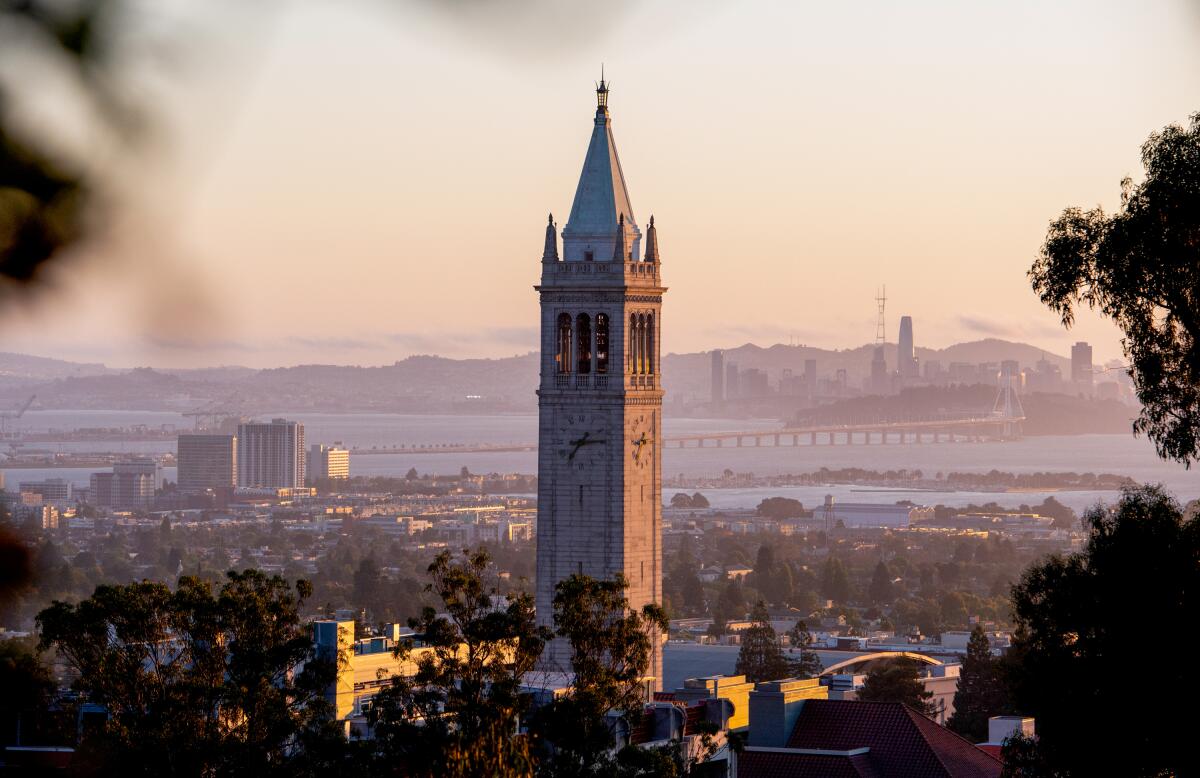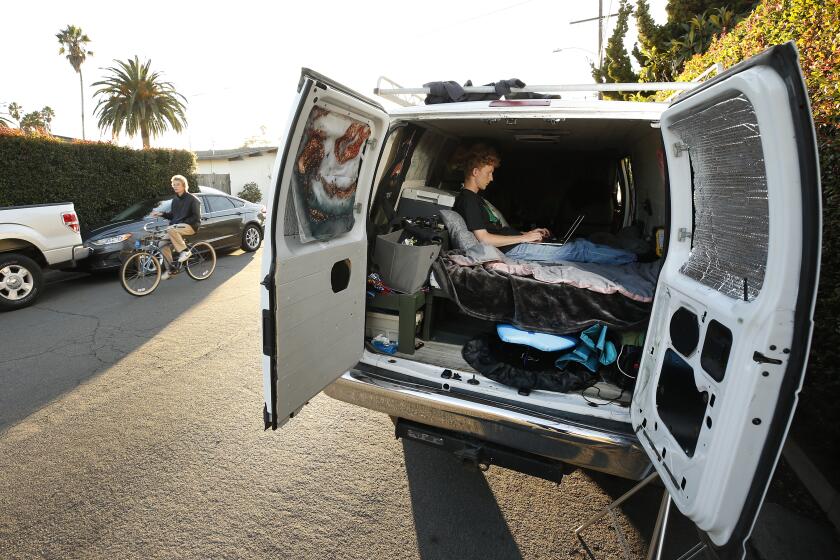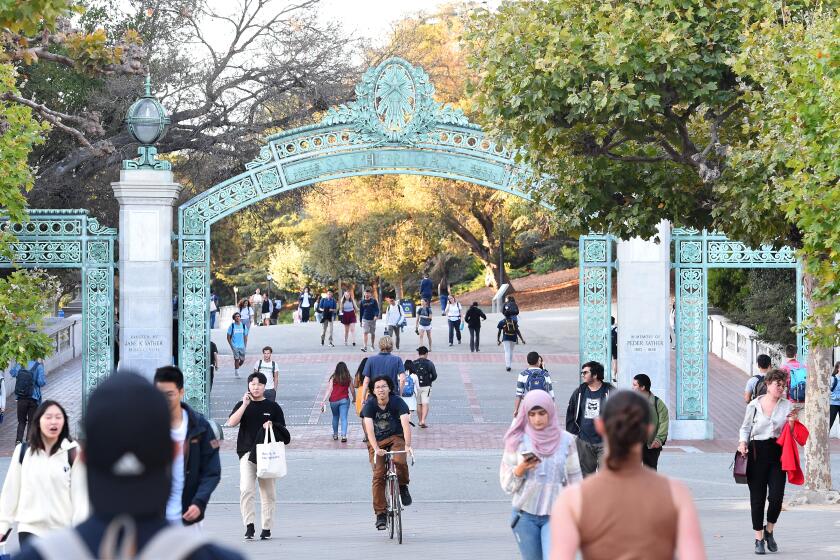UC Berkeley will meet court-ordered enrollment cap with online, deferred admission offers

- Share via
The California Supreme Court on Thursday declined to lift an enrollment cap on UC Berkeley, forcing one of the nation’s most popular campuses to scramble for ways to avoid what it initially feared could be cuts as large as one-third of its incoming fall class, or 3,050 seats, just weeks before it was set to release admission decisions.
A university spokesman said the campus would meet the court-ordered cap by offering at least 1,500 incoming first-year and transfer students online enrollment for fall or deferred admission next January for the spring semester. In addition, some students plan to be away from campus on study programs abroad or in other cities, which would help Berkeley meet the enrollment cap. And many students graduate each winter, freeing up seats for spring.
As a result, Berkeley may only need to cut its incoming 2022-23 class by a few hundred students rather than thousands as initially feared.
The high court rejected the University of California’s appeal to stay a lower court ruling issued in August that froze enrollment at Berkeley until the campus more thoroughly examined the impact of its burgeoning growth on housing, homelessness and noise. The court left intact a ruling by Alameda County Superior Court Judge Brad Seligman, who capped the enrollment of students on the physical campus while the lawsuit filed by Save Berkeley’s Neighborhoods proceeds.
The justices who voted to deny UC’s appeal did so without comment.
Justices Goodwin H. Liu and Joshua P. Groban, however, sided with UC, noting the “acute loss” to prospective students, the negative economic impact on the city of Berkeley with fewer students and the university’s potential loss of $57 million in tuition, which could “undermine California’s interests in expanding access to education.”
But Liu wrote that the denial “need not be the end of the road” for students, noting that the university may renew its request for a stay in the Court of Appeal or the parties may negotiate a settlement.
In a statement, UC Berkeley said it was “extremely disheartened” by Thursday’s ruling but vowed to continue fighting. The university, which earlier said that the loss of tuition revenue would cut available financial aid and squeeze campus operations, said it is seeking potential legislative solutions. Berkeley also said it would prioritize California residents for fall in-person enrollment, both first-year and transfer students.
“We hope to have detailed information about the extent to which the university can mitigate the impact of the court decision by [Friday],” UC Berkeley spokesman Dan Mogulof said. “We are doing everything in our power to finalize the details so they can be shared with the public.”
He added, however, that “regardless, thousands of California students will be unable to have the in-person, on-campus collegiate experience they want and deserve to have.”
A lower court order in response to a lawsuit would force UC Berkeley to slash its incoming class by one-third.
Phil Bokovoy, president of Save Berkeley’s Neighborhoods, said in a statement Thursday that he and his group have long sought to settle the case with Berkeley in exchange for a legally binding agreement to increase housing before expanding enrollment and reiterated their willingness to negotiate. The group told California students it was “as disappointed as they are that UC has tried to use them as pawns in UC’s attempts to avoid mitigating the impacts from the massive enrollment increases over the past few years.”
At Downtown Magnets High School in Los Angeles, students expressed frustration, fear and shock over the high court decision and what it will mean for their college plans.
“It’s honestly really intimidating and scary now that it’s confirmed there will be lower admissions and less financial aid,” said Kristina Sanchez, a senior whose top choices include UC Berkeley, UCLA and UC Irvine.
Students gave mixed reactions to Berkeley’s plan for more offers of online instruction for fall or deferred enrollment for spring. Kristina said she struggled with remote learning during the pandemic — her biology class grades dropped to a low C compared with her usual A’s and Bs — and would prefer to start college in person, even if it meant attending a different university.
Eric Xie-McCarthy said he would accept an online or deferred offer in a heartbeat because Berkeley is his No. 1 choice. Eric, who plans to major in physics, said he is drawn to Berkeley’s top programs in science, technology, engineering and math along with its Bay Area location. “I wouldn’t mind waiting considering how prestigious this university is,” he said. “Networking with Berkeley alumni and professors would be influential to my success.”
The fierce court battle drew national attention — and action by Gov. Gavin Newsom, who weighed in with an amicus letter urging the high court to lift the cap while the litigation proceeds to avoid harm to thousands of hard-working students and undermining the state’s interest in increasing college access.
Newsom’s amicus letter, submitted by state Atty. Gen. Rob Bonta, underscored the enormous stakes at hand. His letter to the state Supreme Court said that expanding access to college — particularly high-demand campuses in the renowned UC system — was a top state priority. Newsom described it as a “keystone” of his higher-education vision on college access, affordability, equity and innovation.
Bokovoy has dismissed these assertions as hyperbole, saying that California students could be protected by cutting admissions of international and out-of-state students. He also said the university is to blame for the crisis by not adequately reviewing the impact of its growth and failing to provide enough housing for students.
An amicus brief in support of Bokovoy’s group called Newsom’s assertions of grave harm to students “an overblown sound bite” and purely speculative. The brief by Berkeley Citizens for a Better Plan, a community group opposing the campus’ long-range development plan, said limiting enrollment would give UC an incentive to “expeditiously and lawfully” conduct the new environmental review ordered by Seligman.
California’s student-housing crisis has forced hundreds of UC students to live in hotel rooms and vehicles. But campus building efforts have sparked litigation and outcry at campuses, including UC Santa Barbara.
In 2005, the university projected in its long-range development plan that it would enroll 33,450 students by 2020. Bokovoy’s group learned in 2017 that Berkeley had exceeded that level by about 30% and one year later sued to force the campus to review the environmental impact of more than 11,000 additional students.
Berkeley conducted the review, finding no significant impact. That prompted the neighborhood group and the city of Berkeley to demand a redo, arguing in a 2019 lawsuit that the campus review was inadequate and the conclusion wrong. In August 2021, Seligman ruled in their favor, ordering Berkeley to perform a more thorough analysis and freeze enrollment at 2020-21 levels until it was completed.
UC appealed that ruling in October, but it wasn’t until January that it asked the appellate court to stay the enrollment cap, because, it said in court papers, it had mistakenly believed the stay would automatically occur. Three weeks ago, the appellate court rejected UC’s appeal for a stay, prompting the university to turn to the high court.
UC Berkeley said the 2020-21 enrollment level was abnormally low because the pandemic had caused an unanticipated drop of more than 800 students who chose to take time off. To meet that level, the campus initially said it would have to reduce admission offers to first-year and transfer students by 5,100 for fall 2022.
The University of California is appealing to the state Supreme Court to stay a lower court ruling that froze enrollment, which would allow Berkeley to avert any cuts in its planned admission targets for fall.
Berkeley is one of the nation’s most applied-to universities, drawing 128,192 first-year applications and 19,345 transfer applications for fall 2022. Last year, its admission rate was 14.5%. In a typical year, the campus admits 21,000 first-year and transfer students and enrolls about 9,500 of them. Admission decisions for fall 2022 are set for release in late March.
Assembly Member Phil Ting (D-San Francisco) said he was disappointed by the high court decision and “angry on behalf of the thousands of students who had their hearts set on attending the country’s most prestigious public university and now may not be admitted through no fault of their own.”
In an interview, the Berkeley alumnus said he was working with UC leaders to explore legislative options, which he declined to detail, that could be passed “in a very short amount of time.”
“We have been looking at different alternatives to assist Berkeley and the university, as well as to assure that all the students who were going to be admitted still can get those admission letters,” Ting said.
More to Read
Sign up for Essential California
The most important California stories and recommendations in your inbox every morning.
You may occasionally receive promotional content from the Los Angeles Times.

















